
Nicola Sturgeon will address the Scottish Parliament with an update on Covid restrictions today — and could introduce further measures to curb the spread of Covid.
A number of restrictions are already in place, but it may be that rhe First Minister goes further, with large gatherings understod to be looming large in the Government's thinking.
But how does Scotland's rules compare with the rest of the UK's?
The Welsh government has announced new Covid rules for sporting events as it continues to look unlikely that Boris Johnson will impose new restrictions in England before Christmas.
Here, are how the newly announced measures in Wales compare with the other UK nations:
– What rules are being introduced in Wales?
From December 26, sporting events will be played behind closed doors to help control the spread of the new Omicron variant which is rising quickly across Wales.
Fans will no longer be allowed to attend either indoor or outdoor sporting events.
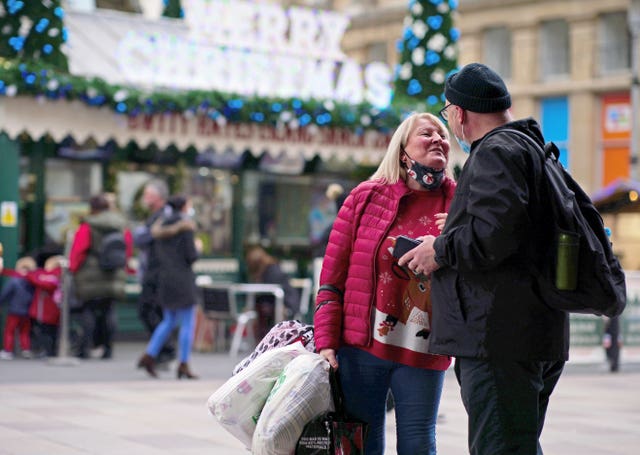 Christmas shoppers walk through the centre of Cardiff, Wales (Ben Birchall/PA)
Christmas shoppers walk through the centre of Cardiff, Wales (Ben Birchall/PA)
A £3 million Spectator Sports Fund will be available to support clubs and sporting venues affected by the new measures to protect public health.
First Minister Mark Drakeford previously announced a mixture of advice for the Christmas period alongside new regulations to follow as part of a “two-phase plan”.
Nightclubs will be closed from December 27 under the new rules, although the Welsh Government has announced a £60 million fund to support any businesses affected by the restrictions.
From the same date, two-metre social distancing will be mandatory in offices, and measures including one-way systems and physical barriers will be introduced in businesses to protect customers and staff.Regulations will also be changed to include a requirement to work from home wherever possible.
Until December 27, the Welsh Government is encouraging people to follow five steps: getting vaccinated; making sure to have a negative lateral flow test result before going shopping or meeting people; meeting in well-ventilated areas – preferably outdoors; spacing out socialising to allow test days in between; and adhering to social distancing, wearing a face covering and washing hands.
It is also urging people to reduce contact with others over the coming days, especially if Christmas plans include seeing older or more vulnerable people.
Mr Drakeford said restricting the number of households allowed to meet remained a possibility, and hinted at the prospect of further restrictions in hospitality settings after Christmas, such as the ‘rule of six’.
– What is the situation in England?
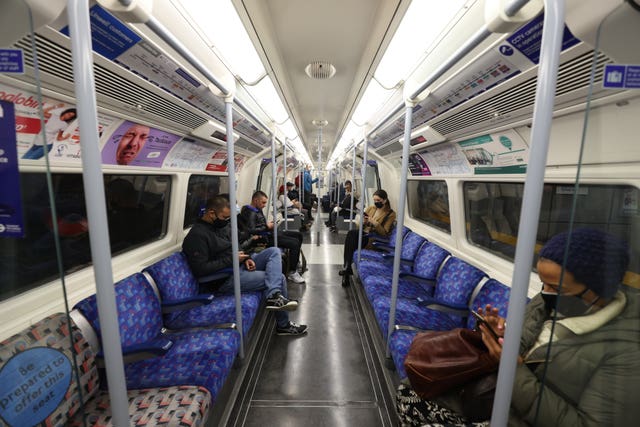 Stricter rules on wearing face masks have been introduced (James Manning/PA)
Stricter rules on wearing face masks have been introduced (James Manning/PA)
There continues to be uncertainty in England over Covid restrictions after the Cabinet on Monday failed to reach a decision, though Mr Johnson said the Government will “reserve the possibility” of implementing new restrictions.
England currently has the most relaxed rules in the UK, but a recent vote in Parliament saw some measures introduced, including Covid passes for entry into nightclubs and other venues as of December 15.
This applies to indoor events with 500 or more attendees where people are likely to stand or move around, such as music venues, outdoor events with 4,000 or more attendees, such as music festivals, and any events with 10,000 or more attendees, whether indoors or outdoors, such as sports stadiums.
Face coverings have also been made compulsory in most indoor public settings, as well as on public transport, and people have been told to work from home if they can.
People aged 18 and over are able to get their third jabs from this week.
England’s guidance is that people should work from home if they can. Anyone who cannot work from home should continue to go in to work – but is encouraged to consider taking lateral flow tests regularly.
 Boris Johnson has ramped up the measures in England (Kirsty O’Connor/PA)
Boris Johnson has ramped up the measures in England (Kirsty O’Connor/PA)
– What about Scotland?
Following news on December 20 that Scotland had recorded its highest test positivity rate since January this year (6,734 new coronavirus cases in 24 hours), the First Minister, Nicola Sturgeon, suggested there will be no changes to coronavirus measures before Christmas but urged people to “stay at home as much as is feasible”.
From December 17, the Scottish Government said businesses across the country are legally required to take “reasonable measures” to minimise transmission of coronavirus.
Advice includes a return to one-way systems in premises, app-based ordering, and the use of screens at service points.
The hospitality sector has also been encouraged to return to table service where practical and to consider measures to reduce crowding.
By law in Scotland, everyone over the age of 12 must wear face coverings indoors, unless exempt, and the new guidance stresses that masks should be worn inside all businesses.
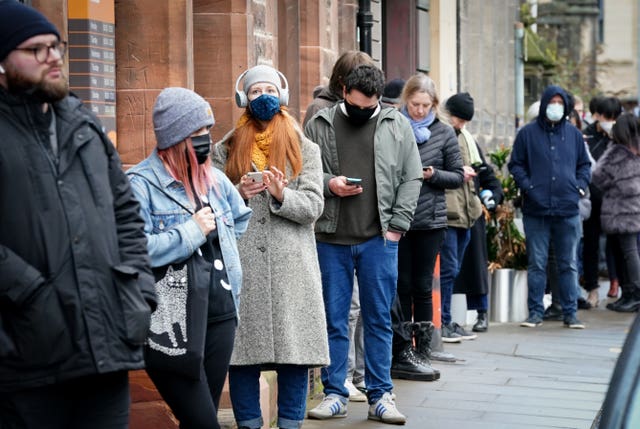 People queue along Junction Place, Edinburgh, for the vaccination centre at the NHS Scotland Leith Community Treatment Centre (Jane Barlow/ PA)
People queue along Junction Place, Edinburgh, for the vaccination centre at the NHS Scotland Leith Community Treatment Centre (Jane Barlow/ PA)
Ministers at Holyrood have found £100 million for business support, with the First Minister announcing that £66 million will go to hospitality, £8 million to businesses in the food and drink supply chain, £20 million to the culture sector, £3 million to the wedding industry and £3 million to the “worst affected parts of tourism”.
But Ms Sturgeon said she could not “give straightforward advice” on whether to advise the cancellation of large events like football matches without assurance that people could be compensated with, for example, financial mechanisms in place earlier in the pandemic.
It was also announced that allowing staff to work from home where possible will again become a legal duty on employers.
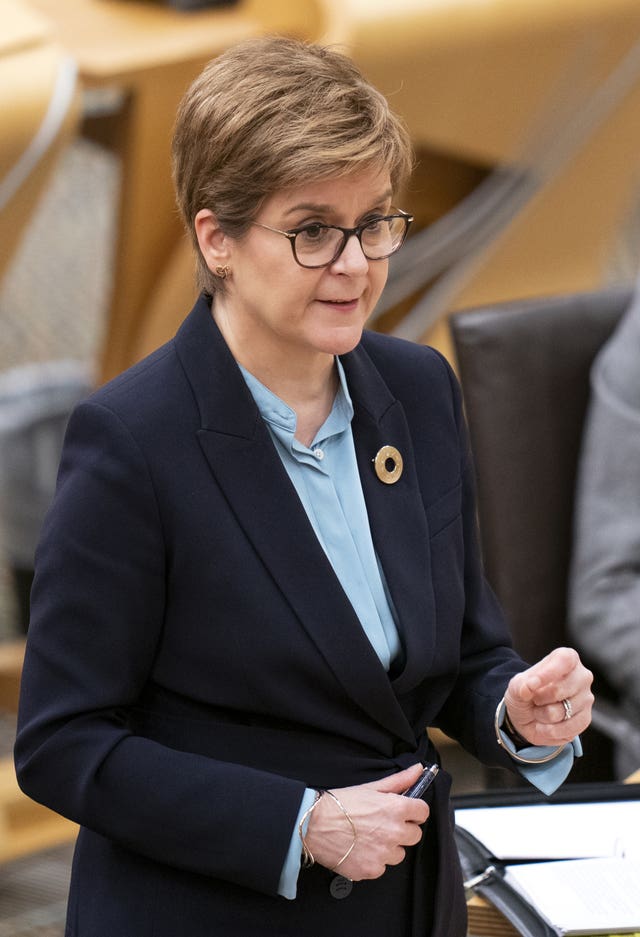 Nicola Sturgeon announced the changes on Tuesday (Jane Barlow/PA)
Nicola Sturgeon announced the changes on Tuesday (Jane Barlow/PA)
Care home visits have also been limited to two households, while all over-18s can book a booster jab appointment online.
– What is Northern Ireland doing?
Following a December 16 meeting to consider the developing Omicron situation, the Executive Office announced that “scenario planning is underway to develop a package of potential measures we could deploy to slow the spread of the virus and when would be the most effective time to deploy them”.
In a joint statement, ministers said: “Those decisions will be underpinned by scientific and medical advice and the Executive will meet again next week to review the data and consider next steps”.
Current advice is that indoor gatherings should have no more than 30 people present, while working from home is also recommended where possible.
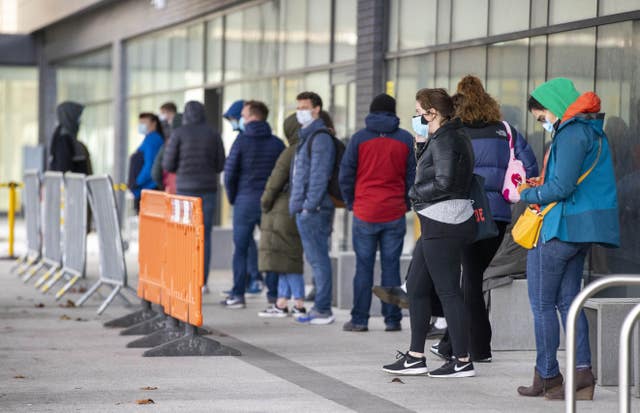 People queuing at the Covid-19 vaccination centre at Dundonald Hospital in Belfast (Liam McBurney/ PA)
People queuing at the Covid-19 vaccination centre at Dundonald Hospital in Belfast (Liam McBurney/ PA)
A scheme that requires people to prove Covid-free status to gain entry to a range of hospitality venues and large-attendance events will be made mandatory.
Those wishing to access nightclubs, pubs, restaurants and other licensed premises will need to provide proof of vaccination, a negative lateral flow test result, or evidence of a previous Covid-19 infection.
The same rules will apply for entry to large indoor and outdoor events such as concerts and sporting events.



Why are you making commenting on The Herald only available to subscribers?
It should have been a safe space for informed debate, somewhere for readers to discuss issues around the biggest stories of the day, but all too often the below the line comments on most websites have become bogged down by off-topic discussions and abuse.
heraldscotland.com is tackling this problem by allowing only subscribers to comment.
We are doing this to improve the experience for our loyal readers and we believe it will reduce the ability of trolls and troublemakers, who occasionally find their way onto our site, to abuse our journalists and readers. We also hope it will help the comments section fulfil its promise as a part of Scotland's conversation with itself.
We are lucky at The Herald. We are read by an informed, educated readership who can add their knowledge and insights to our stories.
That is invaluable.
We are making the subscriber-only change to support our valued readers, who tell us they don't want the site cluttered up with irrelevant comments, untruths and abuse.
In the past, the journalist’s job was to collect and distribute information to the audience. Technology means that readers can shape a discussion. We look forward to hearing from you on heraldscotland.com
Comments & Moderation
Readers’ comments: You are personally liable for the content of any comments you upload to this website, so please act responsibly. We do not pre-moderate or monitor readers’ comments appearing on our websites, but we do post-moderate in response to complaints we receive or otherwise when a potential problem comes to our attention. You can make a complaint by using the ‘report this post’ link . We may then apply our discretion under the user terms to amend or delete comments.
Post moderation is undertaken full-time 9am-6pm on weekdays, and on a part-time basis outwith those hours.
Read the rules hereLast Updated:
Report this comment Cancel